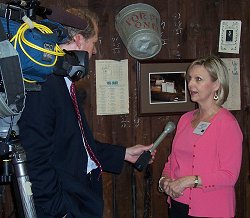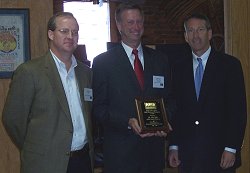You may view this actual article at
http://www.nfib.com/object/IO_27312.html
The following article and images are copied (with permission) from the National Federation of Independent Businesses (NFIB). You may see the actual article at the above URL.
NFIB Members Share Workers' Compensation Concerns With Governor, House Subcommittee Passes Watered-Down Bill
03/16/2006

Gov. Mark Sanford interviewed with the Columbia media at Adluh Flour Mills before holding a spirited workers' comp roundtable with NFIB members.
From all parts of South Carolina, NFIB members traveled to Columbia to discuss their workers' compensation challenges with Gov. Mark Sanford Tuesday. The meeting was held at Adluh Flour Mills, a longtime NFIB member.
Later in the day, several members went to the Capitol to listen to a House subcommittee debate H. 4427, this year's key workers' comp bill.
While the bill passed, it hardly resembled what it once was. According to the Associated Press, provisions that "would have limited fees paid to lawyers, cut awards for back injuries and used strict guidelines for determining payments in the insurance system that pays workers' hospital bills and disability costs" were stripped from the bill. The revised version scales back the Second Injury Fund, but NFIB members support its dissolution.
Several representatives, including Grady Brown, said they have been inundated lately with communications from constituents. "I've received hundreds of phone calls, thousands of e-mails and dozens of letters," said Brown, who challenged Rep. Converse Chellis on some language in the bill, including an amendment stripping AMA guidelines from being used in making judgments. The calls, however, appear to have had little impact on the subcommittee.
Before the disappointing House vote, NFIB members told Gov. Sanford the state's workers' comp system is in a state of serious crisis and shared example after example to make their case. The governor said his concerns are centered on "two opposing trend lines," the evidence that the workplace is getting safer, while "costs are going in the other direction."
After the governor's brief introduction of his understanding of the problem, small-business owners took the bridle.
"A lot of it has to do with television," Charleston member Wes Williamson, who owns Skyline Roofing, said. "[Most South Carolinians] don't realize that [rising workers' comp costs and the increase in settlements] affects everything they pay for."
Walter Carr, another Lowcountry member, said, "Fraud is a major problem." Carr recounted an instance of an alleged back injury to a worker that was settled for $265,000, when the evidence indicated it probably shouldn't have been.
Echoing Carr, Evelyn Perry, owner of Carolina Sound Communications in Charleston, cited two egregious instances of fraud. The first involved a surfer who injured his knee. An insurance company hired a private investigator, who several months later observed the former employee working to erect a carnival and even surfing in the ocean. Rather than pursue the matter through the Workers' Compensation Commission, the insurance company told Perry, "It's cheaper to pay the claim."
Perry believes workers' compensation "as a concept is terrific" and "not a small-business owner I know of has a problem" with its purpose. But she asserted, "To certain employees, it's a lottery. If you do it right, you don't have to go to work again."
She recounted another instance of a legitimate injury she believed should have been covered. But six years later, the claimant requested permanent disability. Perry contacted four other employers who had hired the worker during that period, and all submitted affidavits that he was in good health. The commission, however, determined otherwise, which stunned Perry.

Melinda Fowler, owner of Charlie Brown Day Care, tells WSPA-TV reporter Robert Kittle her workers' comp premiums have increased from $500 to $2,000 in five years despite having no claims.
As the governor listened, others stated their concerns. Florence member Melinda Fowler, owner of Charlie Brown Day Care, said in 27 years her business has never had a claim, but her premiums have risen 368 percent over the last five years and her former carrier has left the state.
"Small employers are handcuffed from making new hires because of the tremendous expenses we're paying," she said.
Keith Smith with Keith Smith Builders in Greer expressed his troubles with the commission turning a blind eye to guidelines from the American Medical Association when making certain judgments. He added, "If [our workers] get hurt, you want them taken care of."
Barbara League from Greenville said workers' comp "has gone from a good system to a very broken system" over her years in business. She said rising workers' comp premiums and access to affordable health insurance are hindering her business's ability to provide 100 percent of all benefits.
Greg Cyrier, whose Bonnaroo Restaurant Group owns and manages several Chili's restaurants in Georgia and South Carolina with plans to expand, caught the governor's attention when he said his workers' comp cost trends in Georgia are declining, but rising in South Carolina.
"It makes you kind of pause [when pondering where to target future expansions]," he said.
Greenville member Carol DeShields with DeShields Grading said one claim took her three years to settle, which was expensive and frustrating. Her business recently experienced three large claims, her policy was canceled and her carrier left the state.

Alan Epley, middle, receives the 2006 Small-Business Champion award for South Carolina from NFIB Media Communications Manager Jim Brown, left, and Gov. Sanford, right.
Several members, including Steve Clark with Springs Insurance in Alan Epley, middle, receives the 2006 Small-Business Champion award for South Carolina from NFIB Media Communications Manager Jim Brown, left, and Gov. Sanford, right. Rock Hill and Willis Ponds with Ponds & Son Construction in Lodge, told the governor many contractors are avoiding the system altogether, opting for ghost policies, which leaves workers uncovered.
If the current trend continues, Clark said, "It's the workers who are going to wind up suffering."
Ponds said he and his father have opted for a policy that merely provides "adequate coverage,' noting the difference in cost is 3 percent versus 13 percent. He also is concerned with the rising number of workers who are unprotected.
Gov. Sanford, who is very popular with NFIB members, stayed after the discussion to have lunch. He presented the 2006 Small-Business Champion award to Alan Epley and also an engraved platter to Donna Shook, who is leaving NFIB after more than five years of outstanding service to South Carolina's small businesses.
- Return to the News Page
- [Home]
- [News]
- [NewsInc500]
- [SCSenateSubCom]
- [Press&Standard]
- [KellerContract]
- [WorkersComp]
- [Past Projects]
- [Select A Builder]
- [Services]
- [FAQ]
- [Contact Us]
- [About Us]
- [Testimonials]
Copyright, 2009, Ponds & Sons Construction Company, Inc. dba Ponds & Sons

